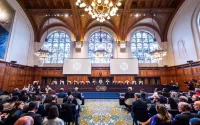They argue it could bring more jobs in agriculture and tourism. Their findings are being scrutinised at a high-powered geographical conference in Glasgow.
Scientists at Stirling University say global warming will bring not just problems but opportunities.
They claim farming could benefit from temperature rises, as marginal land becomes suitable for crops and grazing.
Researchers claim jobs in hotels, tourist attractions and similar industries could more than double if the highest predicted carbon dioxide emissions and associated warmer temperatures occur.
| These preliminary results have serious implications for national policy formulation Dr Ian Moffatt Stirling University |
Experts examined the economic impact of climate change on three areas: Argyll, Stirling and Fife.
Despite the predicted jobs boost, the research team sounded a warning.
They fear that if greenhouse gas emissions continue to grow, some areas of east Scotland may experience more regular droughts in about 80 years.
The academics said it could spell "disaster" for the region's farming industry.
They predicted the threat of "considerable problems with water resources" in the east of Scotland.
Dr Ian Moffatt said it was "vital" greenhouse gas emissions were reduced to make development sustainable.
"These preliminary results have serious implications for national policy formulation, as well as the planning of infrastructure and resource allocation at regional and local scales," he said.
Record temperatures
Dr Moffatt added: "We need to be aware of the geographical variations and the problems and opportunities associated with global warming."
The scientists' claims were on Friday being put under the microscope at the 30th Congress of the International Geographical Union, which attracted about 1,800 delegates from some 80 countries.
Earlier, Met Office figures showed that in 2003 Scotland basked in the hottest year since official records began in 1961.
The environmental group, WWF Scotland, went further and claimed it was the warmest year for at least 140 years - and issued a warning over climate change.
Head of policy Dr Richard Dixon said at the time: "Climate change is a growing reality, and is the biggest environmental threat facing Scotland."
He urged the Scottish Executive to commit itself to reducing greenhouse gases by 20% by 2010.
http://newsvote.bbc.co.uk/mpapps/pagetools/print/news.bbc.co.uk/2/hi/uk_news/scotland/3582198.stm






